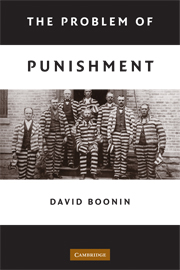3 - The Retributivist Solution
Published online by Cambridge University Press: 05 June 2012
Summary
OVERVIEW
The consequentialist solution to the problem of punishment is essentially forward-looking. It attempts to justify punishing offenders in the present by appealing to the beneficial effects that this will bring about in the future. I argued in Chapter 2 that this solution is unsuccessful. The retributivist solution, by contrast, is essentially backward-looking. It claims that committing an offense in the past is sufficient to justify punishment now, whether or not this will produce any beneficial consequences in the future. Some people accept the retributivist justification of punishment simply because they are repelled by the consequentialist alternative. Primoratz, for example, argues that it is reasonable to “set out from the assumption that the institution of punishment is not unjustifiable in principle” and then to justify the retributivist position by identifying the unacceptable “implications of the competing justifications of punishment” (1989a: 148). Leslie T. Wilkins justifies his endorsement of the retributivist conclusion of the Report of the Committee for the Study of Incarceration by explaining that “I cannot accept it as a declaration of a desirable policy – it is merely less unacceptable than any others which can be considered at this time” [quoted in Von Hirsch (1976: 178)]. And Moore has expressed sympathy for what he calls the “reluctant retributivist” who becomes “a retributivist by default” because he finds “decisive objections” to all the other attempts to justify punishment (1987: 97).
Information
- Type
- Chapter
- Information
- The Problem of Punishment , pp. 85 - 154Publisher: Cambridge University PressPrint publication year: 2008
